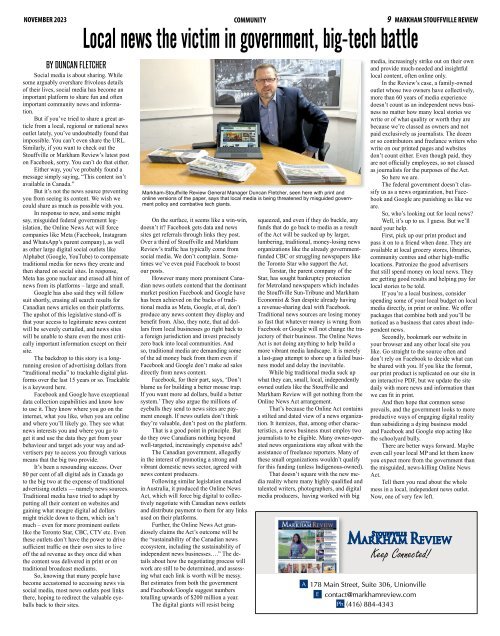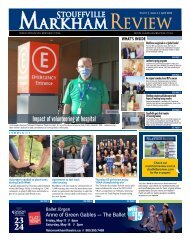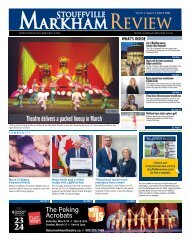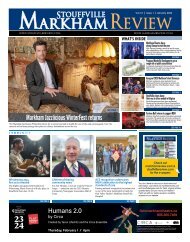Create successful ePaper yourself
Turn your PDF publications into a flip-book with our unique Google optimized e-Paper software.
NOVEMBER <strong>2023</strong><br />
COMMUNITY 9 MARKHAM STOUFFVILLE REVIEW<br />
Local news the victim in government, big-tech battle<br />
BY DUNCAN FLETCHER<br />
Social media is about sharing. While<br />
some arguably overshare frivolous details<br />
of their lives, social media has become an<br />
important platform to share fun and often<br />
important community news and information.<br />
But if you’ve tried to share a great article<br />
from a local, regional or national news<br />
outlet lately, you’ve undoubtedly found that<br />
impossible. You can’t even share the URL.<br />
Similarly, if you want to check out the<br />
<strong>Stouffville</strong> or <strong>Markham</strong> <strong>Review</strong>’s latest post<br />
on Facebook, sorry. You can’t do that either.<br />
Either way, you’ve probably found a<br />
message simply saying, “This content isn’t<br />
available in Canada.”<br />
But it’s not the news source preventing<br />
you from seeing its content. We wish we<br />
could share as much as possible with you.<br />
In response to new, and some might<br />
say, misguided federal government legislation,<br />
the Online News Act will force<br />
companies like Meta (Facebook, Instagram<br />
and WhatsApp’s parent company), as well<br />
as other large digital social outlets like<br />
Alphabet (Google, YouTube) to compensate<br />
traditional media for news they create and<br />
then shared on social sites. In response,<br />
Meta has gone nuclear and erased all hint of<br />
news from its platforms – large and small.<br />
Google has also said they will follow<br />
suit shortly, erasing all search results for<br />
Canadian news articles on their platforms.<br />
The upshot of this legislative stand-off is<br />
that your access to legitimate news content<br />
will be severely curtailed, and news sites<br />
will be unable to share even the most critically<br />
important information except on their<br />
site.<br />
The backdrop to this story is a longrunning<br />
erosion of advertising dollars from<br />
“traditional media” to trackable digital platforms<br />
over the last 15 years or so. Trackable<br />
is a keyword here.<br />
Facebook and Google have exceptional<br />
data collection capabilities and know how<br />
to use it. They know where you go on the<br />
internet, what you like, when you are online<br />
and where you’ll likely go. They see what<br />
news interests you and where you go to<br />
get it and use the data they get from your<br />
behaviour and target ads your way and advertisers<br />
pay to access you through various<br />
means that the big two provide.<br />
It’s been a resounding success. Over<br />
80 per cent of all digital ads in Canada go<br />
to the big two at the expense of traditional<br />
advertising outlets — namely news sources.<br />
Traditional media have tried to adapt by<br />
putting all their content on websites and<br />
gaining what meagre digital ad dollars<br />
might trickle down to them, which isn’t<br />
much – even for more prominent outlets<br />
like the Toronto Star, CBC, CTV etc. Even<br />
these outlets don’t have the power to drive<br />
sufficient traffic on their own sites to live<br />
off the ad revenue as they once did when<br />
the content was delivered in print or on<br />
traditional broadcast mediums.<br />
So, knowing that many people have<br />
become accustomed to accessing news via<br />
social media, most news outlets post links<br />
there, hoping to redirect the valuable eyeballs<br />
back to their sites.<br />
<strong>Markham</strong>-<strong>Stouffville</strong> <strong>Review</strong> General Manager Duncan Fletcher, seen here with print and<br />
online versions of the paper, says that local media is being threatened by misguided government<br />
policy and combative tech giants.<br />
On the surface, it seems like a win-win,<br />
doesn’t it? Facebook gets data and news<br />
sites get referrals through links they post.<br />
Over a third of <strong>Stouffville</strong> and <strong>Markham</strong><br />
<strong>Review</strong>’s traffic has typically come from<br />
social media. We don’t complain. Sometimes<br />
we’ve even paid Facebook to boost<br />
our posts.<br />
However many more prominent Canadian<br />
news outlets contend that the dominant<br />
market position Facebook and Google have<br />
has been achieved on the backs of traditional<br />
media as Meta, Google, et al, don’t<br />
produce any news content they display and<br />
benefit from. Also, they note, that ad dollars<br />
from local businesses go right back to<br />
a foreign jurisdiction and invest precisely<br />
zero back into local communities. And<br />
so, traditional media are demanding some<br />
of the ad money back from them even if<br />
Facebook and Google don’t make ad sales<br />
directly from news content.<br />
Facebook, for their part, says, ‘Don’t<br />
blame us for building a better mouse trap.<br />
If you want more ad dollars, build a better<br />
system.’ They also argue the millions of<br />
eyeballs they send to news sites are payment<br />
enough. If news outlets don’t think<br />
they’re valuable, don’t post on the platform.<br />
That is a good point in principle. But<br />
do they owe Canadians nothing beyond<br />
well-targeted, increasingly expensive ads?<br />
The Canadian government, allegedly<br />
in the interest of promoting a strong and<br />
vibrant domestic news sector, agreed with<br />
news content producers.<br />
Following similar legislation enacted<br />
in Australia, it produced the Online News<br />
Act, which will force big digital to collectively<br />
negotiate with Canadian news outlets<br />
and distribute payment to them for any links<br />
used on their platforms.<br />
Further, the Online News Act grandiosely<br />
claims the Act’s outcome will be<br />
the “sustainability of the Canadian news<br />
ecosystem, including the sustainability of<br />
independent news businesses….” The details<br />
about how the negotiating process will<br />
work are still to be determined, and assessing<br />
what each link is worth will be messy.<br />
But estimates from both the government<br />
and Facebook/Google suggest numbers<br />
totalling upwards of $200 million a year.<br />
The digital giants will resist being<br />
squeezed, and even if they do buckle, any<br />
funds that do go back to media as a result<br />
of the Act will be sucked up by larger,<br />
lumbering, traditional, money-losing news<br />
organizations like the already governmentfunded<br />
CBC or struggling newspapers like<br />
the Toronto Star who support the Act.<br />
Torstar, the parent company of the<br />
Star, has sought bankruptcy protection<br />
for Metroland newspapers which includes<br />
the <strong>Stouffville</strong> Sun-Tribune and <strong>Markham</strong><br />
Economist & Sun despite already having<br />
a revenue-sharing deal with Facebook.<br />
Traditional news sources are losing money<br />
so fast that whatever money is wrung from<br />
Facebook or Google will not change the trajectory<br />
of their business. The Online News<br />
Act is not doing anything to help build a<br />
more vibrant media landscape. It is merely<br />
a last-gasp attempt to shore up a failed business<br />
model and delay the inevitable.<br />
While big traditional media suck up<br />
what they can, small, local, independently<br />
owned outlets like the <strong>Stouffville</strong> and<br />
<strong>Markham</strong> <strong>Review</strong> will get nothing from the<br />
Online News Act arrangement.<br />
That’s because the Online Act contains<br />
a stilted and dated view of a news organization.<br />
It itemizes, that, among other characteristics,<br />
a news business must employ two<br />
journalists to be eligible. Many owner-operated<br />
news organizations stay afloat with the<br />
assistance of freelance reporters. Many of<br />
these small organizations wouldn’t qualify<br />
for this funding (unless Indigenous-owned).<br />
That doesn’t square with the new media<br />
reality where many highly qualified and<br />
talented writers, photographers, and digital<br />
media producers, having worked with big<br />
media, increasingly strike out on their own<br />
and provide much-needed and insightful<br />
local content, often online only.<br />
In the <strong>Review</strong>’s case, a family-owned<br />
outlet whose two owners have collectively,<br />
more than 60 years of media experience<br />
doesn’t count as an independent news business<br />
no matter how many local stories we<br />
write or of what quality or worth they are<br />
because we’re classed as owners and not<br />
paid exclusively as journalists. The dozen<br />
or so contributors and freelance writers who<br />
write on our printed pages and websites<br />
don’t count either. Even though paid, they<br />
are not officially employees, so not classed<br />
as journalists for the purposes of the Act.<br />
So here we are.<br />
The federal government doesn’t classify<br />
us as a news organization, but Facebook<br />
and Google are punishing us like we<br />
are.<br />
So, who’s looking out for local news?<br />
Well, it’s up to us. I guess. But we’ll<br />
need your help.<br />
First, pick up our print product and<br />
pass it on to a friend when done. They are<br />
available at local grocery stores, libraries,<br />
community centres and other high-traffic<br />
locations. Patronize the good advertisers<br />
that still spend money on local news. They<br />
are getting good results and helping pay for<br />
local stories to be told.<br />
If you’re a local business, consider<br />
spending some of your local budget on local<br />
media directly, in print or online. We offer<br />
packages that combine both and you’ll be<br />
noticed as a business that cares about independent<br />
news.<br />
Secondly, bookmark our website in<br />
your browser and any other local site you<br />
like. Go straight to the source often and<br />
don’t rely on Facebook to decide what can<br />
be shared with you. If you like the format,<br />
our print product is replicated on our site in<br />
an interactive PDF, but we update the site<br />
daily with more news and information than<br />
we can fit in print.<br />
And then hope that common sense<br />
prevails, and the government looks to more<br />
productive ways of engaging digital reality<br />
than subsidizing a dying business model<br />
and Facebook and Google stop acting like<br />
the schoolyard bully.<br />
There are better ways forward. Maybe<br />
even call your local MP and let them know<br />
you expect more from the government than<br />
the misguided, news-killing Online News<br />
Act.<br />
Tell them you read about the whole<br />
mess in a local, independent news outlet.<br />
Now, one of very few left.

















